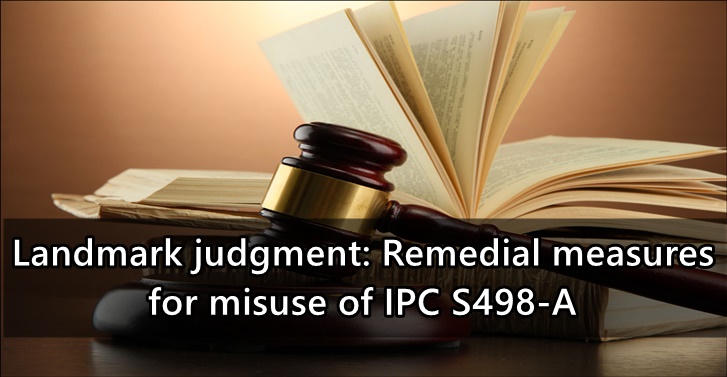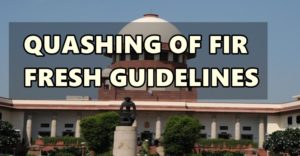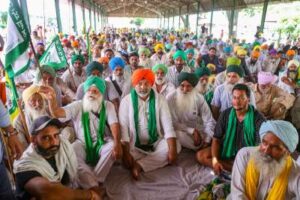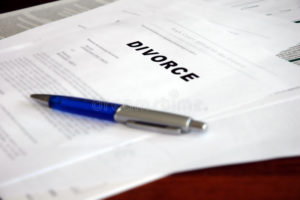The Landmark Judgment Given by the Hon’ble Supreme Court of India in Rajesh Sharma & ors Vs State of UP & Anrs
The complainant alleged that she was married to appellant No.1 on 28th November, 2012. Her father gave dowry as per his capacity but the appellants were not happy with the extent of the dowry. They started abusing the complainant. They made a demand of dowry of Rs.3,00,000/- and a car which the family could not arrange. On 10th November, 2013, appellant No.1 dropped the complainant at her matrimonial home. She was pregnant and suffered pain in the process and her pregnancy was terminated. On the said version, and further version that her Stridhan was retained, appellant No.1 was summoned under Section 498A and Section 323 IPC. Appellants 2 to 5 were not summoned. Order dated 14th July, 2014 read as follows:
“After perusal of the file and the document brought on record. It is clear that the husband Shri Rajesh Sharma demanded car and three lacs rupees and in not meeting the demand. It appears that he has tortured the complainant.
So far as torture and retaining of the stri dhan and demanding 50,000 and a gold chain and in not meeting the demand the torture is attributable against Shri Rajesh Sharma. Rajesh Sharma appears to be main accused. In the circumstances, rest of the accused Vijay Sharma, Jaywati Sharma, Praveen Sharma and Priyanka Sharma have not committed any crime and they have not participated in commission of the crime. Whereas, it appears that Rajesh Sharma has committed an offence under Section 498A, 323 IPC and read with section 3 / 4 DP act appears to have prima facie made out. Therefore, a summon be issued against him.”
Against the above order, respondent No.2 preferred a revision petition and submitted that appellants 2 to 5 should also have been summoned. The said petition was accepted by the Additional Sessions Judge, Jaunpur vide order dated 3rd July, 2015. The trial court was directed to take a fresh decision in the matter. Thereafter, the trial court vide order dated 18th August, 2015 summoned appellants 2 to 5 also. The appellants approached the High Court under Section 482 CrPC against the order of summoning. Though the matter was referred to the mediation centre, the mediation failed. Thereafter, the High Court found no ground to interfere with the order of summoning and dismissed the petition. Hence this appeal.
The Hon’ble court Further says,
According to Reports of National Crime Record Bureau in 2005, for a total 58,319 cases reported under Section 498A IPC, a total of 1,27,560 people were arrested, and 6,141 cases were declared false on account of mistake of fact or law. While in 2009 for a total 89,546 cases reported, a total of 1,74,395 people were arrested and 8,352 cases were declared false on account of mistake of fact or law.
The Report further shows that approximately a quarter of those arrested were women that is 47,951 of the total were perhaps mother or sisters of the husband. However most surprisingly the rate of charge-sheet filing for the year 2012, under Section 498A IPC was at an exponential height of 93.6% while the conviction rate was at a staggering low at 14.4% only. The Report stated that as many as 3,72,706 cases were pending trial of which 3,17,000 were projected to be acquitted.
It is Shocking News for all of US
That according to Report of Crime in India, 2013, the National Crime Records Bureau further pointed out that of 4,66,079 cases that were pending in the start of 2013, only 7,258 were convicted while 38,165 were acquitted and 8,218 were withdrawn. The conviction rate of cases registered under Section 498A IPC was also a staggering low at 15.6%.”
IN Sushil Kumar Sharma versus Union of India,
The Madras High Court in M.P. No.1 of 2008 in Cr. O.P. No.1089 of 2008 dated 4th August, 2008 directed issuance of following guidelines:
“It must also be borne in mind that the object behind the enactment of Section 498-A IPC and the Dowry Prohibition 1 (2005) 6 SCC 281 2 (2010) 7 SCC 667 3 (2010) 13 SCC 540 4 ILR (2003) I Delhi 484 Act is to check and curb the menace of dowry and at the same time, to save the matrimonial homes from destruction. Our experience shows that, apart from the husband, all family members are implicated and dragged to the police stations. Though arrest of those persons is not at all necessary, in a number of cases, such harassment is made simply to satisfy the ego and anger of the complainant. By suitably dealing with such matters, the injury to innocents could be avoided to a considerable extent by the Magistrates, but, if the Magistrates themselves accede to the bare requests of the police without examining the actual state of affairs, it would create negative effects thereby, the very purpose of the legislation would be defeated and the doors of conciliation would be closed forever. The husband and his family members may have difference of opinion in the dispute, for which, arrest and judicial remand are not the answers. The ultimate object of every legal system is to punish the guilty and protect the innocents.”
Delhi High Court vide order dated 4th August, 2008 in Chander Bhan versus State5 in Bail Application No.1627/2008 directed issuance of following guidelines :
“2. Police Authorities:
(a) Pursuant to directions given by the Apex Court, the Commissioner of Police, Delhi vide Standing Order No.330/2007 had already issued guidelines for arrest in the dowry cases registered under Sections 498-A/406 IPC and the said guidelines should be followed by the Delhi Police strictly and scrupulously.
(i) No case under Section 498-A/406 IPC should be registered without the prior approval of DCP/Addl.DCP.
(ii) Arrest of main accused should be made only after thorough investigation has been conducted and with the prior approval of the ACP/DCP. 5 (2008) 151 DLT 691
(iii) Arrest of the collateral accused such as father-in-law, mother-in-law, brother-in-law or sister-in-law etc. should only be made after prior approval of DCP on file.
(b) Police should also depute a well trained and a well behaved staff in all the crime against women cells especially the lady officers, all well equipped with the abilities of perseverance, persuasion, patience and forbearance.
(c) FIR in such cases should not be registered in a routine manner.
(d) The endeavor of the Police should be to scrutinize complaints very carefully and then register FIR.
(e) The FIR should be registered only against those persons against whom there are strong allegations of causing any kind of physical or mental cruelty as well as breach of trust.
(f) All possible efforts should be made, before recommending registration of any FIR, for reconciliation and in case it is found that there is no possibility of settlement, then necessary steps in the first instance be taken to ensure return of stridhan and dowry articles etc. by the accused party to the complainant.”
In Arnesh Kumar vs State of Bihar, The Hon’ble Supreme Court Also directed as follows :
1. All the State Governments to instruct its police officers not to automatically arrest when a case under Section 498-A of the IPC is registered but to satisfy themselves about the necessity for arrest under the parameters laid down above flowing from Section 41, Cr.PC;
2 All police officers be provided with a check list containing specified sub-clauses under Section 41(1)(b)(ii);6 (2014) 8 SCC 273
3 The police officer shall forward the check list duly filed and furnish the reasons and materials which necessitated the arrest, while forwarding/producing the accused before the Magistrate for further detention
4 The Magistrate while authorizing detention of the accused shall peruse the report furnished by the police officer in terms aforesaid and only after recording its satisfaction, the Magistrate will authorize detention;
5. The decision not to arrest an accused, be forwarded to the Magistrate within two weeks from the date of the institution of the case with a copy to the Magistrate which may be extended by the Superintendent of police of the district for the reasons to be recorded in writing;
6 Notice of appearance in terms of Section 41A of Cr.PC be served on the accused within two weeks from the date of institution of the case, which may be extended by the Superintendent of Police of the District for the reasons to be recorded in writing;
7 Failure to comply with the directions aforesaid shall apart from rendering the police officers concerned liable for departmental action, they shall also be liable to be punished for contempt of court to be instituted before High Court having territorial jurisdiction.
8 Authorizing detention without recording reasons as aforesaid by the judicial Magistrate concerned shall be liable for departmental action by the appropriate High Court.”
In My opinion there must be some preliminary inquiry on the lines of observations, the arrest in an offence under Section 498Ashould be only after recording reasons and express approval from the Superintendent of Police. In respect of relatives who are ordinarily residing outside India, the matter should proceed only if 7 (2014) 2 SCC 1 the IO is convinced that arrest is necessary for fair investigation. In such cases impounding of passport or issuance of red corner notice should be avoided. Procedure under Section 14 of the Protection of Women from Domestic Violence Act, 2005, of counseling should be made mandatory before registration of a case under Section 498A.
To remedy the situation, we are of the view that involvement of civil society in the aid of administration of justice can be one of the steps, apart from the investigating officers and the concerned 12 Gian Singh vs. State of Punjab (2012) 10 SCC 303- para-61, (2014) 5 SCC 364- para -14 trial courts being sensitized. It is also necessary to facilitate closure of proceedings where a genuine settlement has been reached instead of parties being required to move High Court only for that purpose.
Thus, after careful consideration of the whole issue, The Hon’ble Supreme Court gives following directions:-
(i)(a) In every district one or more Family Welfare Committees be constituted by the District Legal Services Authorities preferably comprising of three members. The constitution and working of such committees may be reviewed from time to time and at least once in a year by the District and Sessions Judge of the district who is also the Chairman of the District Legal Services Authority.
(b) The Committees may be constituted out of Para legal volunteers/social workers/retired persons/wives of working officers/other citizens who may be found suitable and willing.
(c) The Committee members will not be called as witnesses.
(d) Every complaint under Section 498A received by the police or the Magistrate be referred to and looked into by such committee. Such committee may have interaction with the parties personally or by means of telephone or any other mode of communication including electronic communication.
(e) Report of such committee be given to the Authority by whom the complaint is referred to it latest within one month from the date of receipt of complaint.
(f) The committee may give its brief report about the factual aspects and its opinion in the matter.
(g) Till report of the committee is received, no arrest should normally be affected.
(h) The report may be then considered by the Investigating Officer or the Magistrate on its own merit.
(i) Members of the committee may be given such basic minimum training as may be considered necessary by the Legal Services Authority from time to time.
(j) The Members of the committee may be given such honorarium as may be considered viable.
(k) It will be open to the District and Sessions Judge to utilize the cost fund wherever considered necessary and proper.
ii) Complaints under Section 498A and other connected offences may be investigated only by a designated Investigating Officer of the area. Such designations may be made within one month from today. Such designated officer may be required to undergo training for such duration (not less than one week) as may be considered appropriate. The training may be completed within four months from today;
iii) In cases where a settlement is reached, it will be open to the District and Sessions Judge or any other senior Judicial Officer nominated by him in the district to dispose of the proceedings including closing of the criminal case if dispute primarily relates to matrimonial discord;
iv) If a bail application is filed with at least one clear day’s notice to the Public Prosecutor/complainant, the same may be decided as far as possible on the same day. Recovery of disputed dowry items may not by itself be a ground for denial of bail if maintenance or other rights of wife/minor children can otherwise be protected. Needless to say that in dealing with bail matters, individual roles, prima facie truth of the allegations, requirement of further arrest/ custody and interest of justice must be carefully weighed;
v) In respect of persons ordinarily residing out of India impounding of passports or issuance of Red Corner Notice should not be a routine;
vi) It will be open to the District Judge or a designated senior judicial officer nominated by the District Judge to club all connected cases between the parties arising out of matrimonial disputes so that a holistic view is taken by the Court to whom all such cases are entrusted; and
vii) Personal appearance of all family members and particularly outstation members may not be required and the trial court ought to grant exemption from personal appearance or permit appearance by video conferencing without adversely affecting progress of the trial.
viii) These directions will not apply to the offences involving tangible physical injuries or death.
After seeing the working of the above arrangement for six months but latest by March 31, 2018, National Legal Services Authority may give a report about need for any change in above directions or for any further directions. The matter may be listed for consideration by the Court in April, 2018.
It is the landmark Judgment Given by the Hon’ble Suprme court OF India .
TO DEFEND YOUR 498A CASE OR FOR ANY FREE LEGAL ADVICE YOU MAY CONTAIN TO THE FOLLOWOING
This article is written by ANIL SRIVASTAV ADVOCATE DELHI HIGH COURT and Supreme Court Of India You can read my blog and reach to me on www.advocateanil.skynova.io or www.facebook.com/anilsrivastav89 mail me at[email protected] www.twitter.com/anilsrivastav03 you also can call me to further advice or file the cases of this kind or any kind@ 9716757592 or9643831103.
Search Legal services by Anil Srivastav Advocate on Google to reach me or find latest services by me.



